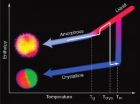(Press-News.org) (Garrison, NY) As government support for personalized medicine grows, a consumer advocate, a patient, and bioethicists explore ethical controversies. Direct-to-consumer genetic tests, privacy, targeted cancer therapies, and Henrietta Lacks are among topics in a special issue of the Hastings center Report
Behind the high expectations raised by personalized medicine – the use of genetic information to individualize treatment, improve care, and possibly save money – a series of essays in the Hastings Center Report examines the challenges in determining what is effective; benefits and drawbacks for patients; and consumers' right to their genetic information, however imperfect. Ronni Sandroff, an editorial director of Consumer Reports, writes on controversies surrounding direct-to-consumer tests and discusses her essay in a podcast.
"The Prospects for Personalized Medicine." A roundup of recent government initiatives to promote personalized medicine, successes with genetically customized drug treatments, and quality control problems with genetic tests is given by Shara Yurkiewicz, a first-year student at Harvard Medical School.
"Personalized Medicine's Ragged Edge." How should we determine who should get expensive treatments? If there were a thick, bright line separating the minimal responders from the maximal responders, then we could allocate these treatments fairly. But the reality, explains Leonard Fleck, a bioethicist at Michigan State University, is more like a ragged edge – some people will clearly benefit a lot, some people will clearly not benefit at all, and many people will benefit somewhat.
"Personalized Cancer Care in an Age of Anxiety." To get an idea of how personalized medicine could reshape patient care in the years ahead, one need only look at how it is beginning to reshape the care of patients with cancer, writes Susan Gilbert, Hastings Center staff writer, who surveys those changes.
"A Patient's Experience." Marian Fontana, a New York author, describes her experience with genetic testing to guide her treatment for breast cancer.
"Direct-to-Consumer Genetic Tests and the Right to Know." Ronni Sandroff, editorial director, Family and Health, of Consumer Reports, appraises the young DTC genetic testing industry in the wake of recent government investigations that exposed inaccuracies and other problems. She argues against having doctors as gatekeepers of genetic information and favors government regulation to insure that the DTC tests are reliable and are not used as marketing devices for unproven products.
"Wanted: Human Biospecimens." For personalized medicine to realize its potential, researchers will need thousands of samples of human tissue, blood, urine, and other biospecimens for genetic studies, writes Karen Maschke, a Hastings Center research scholar. But this need has raised many ethical issues around informed consent and privacy, rendered vividly by recent events, including lawsuits involving use of newborn screening blood samples for research, a legal settlement with the Havasupai Indian tribe over genetic research with their blood, and publication of the bestselling book on the "immortal cells" of Henrietta Lacks.
INFORMATION:
END
MANHATTAN, KAN. -- While natural food is a rising trend among humans, pet owners should be careful before feeding similar types of food to their pets, according to a Kansas State University veterinarian.
All too often pet owners assume that because certain foods, such as fruits and vegetables, are healthy for them, they are also healthy for their pets, said Susan Nelson, K-State assistant professor of clinical services.
"Natural and veggie-based pet foods are based more on market demand from owners, not because they are necessarily better for the pet," she said.
Natural ...
The ability of phase-change materials to readily and swiftly transition between different phases has made them valuable as a low-power source of non-volatile or "flash" memory and data storage. Now an entire new class of phase-change materials has been discovered by researchers with the Lawrence Berkeley National Laboratory (Berkeley Lab) and the University of California (UC) Berkeley that could be applied to phase change random access memory (PCM) technologies and possibly optical data storage as well. The new phase-change materials – nanocrystal alloys of a metal and ...
In 2008, Reuben Granich and his colleagues at the World Health Organization published a paper in the medical journal The Lancet that proposed a new strategy for combating HIV in South Africa, a country staggered by the virus, with as much as 18 percent of the population estimated to be infected.
Based on a mathematical model, the study suggested a "test-and-treat" strategy. This would involve, among other steps, testing the entire population of South Africa for HIV and immediately beginning anti-retroviral therapy for all who tested positive. The current standard of ...
UCLA physicists have taken a significant step in controlling chemical reactions mechanically, an important advance in nanotechnology, UCLA physics professor Giovanni Zocchi and colleagues report.
Chemical reactions in the cell are catalyzed by enzymes, which are protein molecules that speed up reactions. Each protein catalyzes a specific reaction. In a chemical reaction, two molecules collide and exchange atoms; the enzyme is the third party, the "midwife to the reaction."
But the molecules have to collide in a certain way for the reaction to occur. The enzyme binds ...
For the first time in more than ten years, there has been a confirmed sighting of one of the rarest and most mysterious animals in the world, the saola of Laos and Vietnam. The Government of the Lao People's Democratic Republic (also known as Laos) announced on September15 that in late August villagers in the central province of Bolikhamxay captured a saola and brought it back to their village. The animal died several days later, but was photographed while still alive.
This is the first confirmed record of the species since two photographs of wild saola were taken ...
DALLAS – Sept. 17, 2010 – UT Southwestern Medical Center investigators have uncovered new insights on adolescent fighting: what triggers it, and how to stem it.
Varied real-life factors pile on daily to put teens on edge: destructive behaviors like drug abuse, drinking or high-risk sexual encounters; poverty; academic troubles; and even depression. Data analyzed by researchers at UT Southwestern suggests that when teens perceive support from their families and/or schools, it can help mitigate violence.
"Our findings tell us that it's unlikely that traditional cookie-cutter ...
Terrorist networks are complex. Now, a mathematical analysis of their properties published this month in the International Journal of Networking and Virtual Organisations, suggests that the best way to fight them is to isolate the hubs within the network rather than trying to destroy the network as a whole through short-term battles.
According to Philip Vos Fellman a Lecturer at Suffolk University, Boston, and member of the New England Complex Systems Institute, USA, tools used to analyze complex systems can also be used to study terrorist networks with a view to undermining ...
LIVERPOOL, UK – 17 September 2010: Research at the University of Liverpool could lead to faster and more accurate diagnoses of liver damage.
The team used paracetamol as the basis for the study: research indicates that paracetamol can place temporary stress on the liver in around a third of people who take a normal dose (4g per day) but the liver returns to normal when the drug has left the system. Overdoses of the drug are a major cause of liver failure in both the UK and US.
Scientists have discovered that the presence of specific proteins in the blood are indicative ...
"A sedentary lifestyle has become one of the major public health problems in developed countries", Juan P. Rey-López, lead author of the study and a researcher at the University of Zaragoza (UNIZAR), tells SINC. "During the week, one-third of teenagers said the watched more than two hours of television per day. At weekends, this figure exceeds 60%".
The results, published in the July issue of the journal Preventive Medicine, show that teenagers devote more time to sedentary behaviour (in front of a screen) at the weekend.
The study, which forms part of the European ...
The increase of artificial night lighting is only one of the consequences of intense urbanization. There is no doubt that chemical and noise pollution can have a strong impact on ecosystems. To date, however, the more subtle consequences of light pollution on wild populations of animals have not received enough attention. Scientists of the Max Planck Institute for Ornithology have now shown that permanent night lighting alters the reproductive behaviour of birds. In those habitats that are affected by artificial light, males started to sing earlier and females advanced ...



